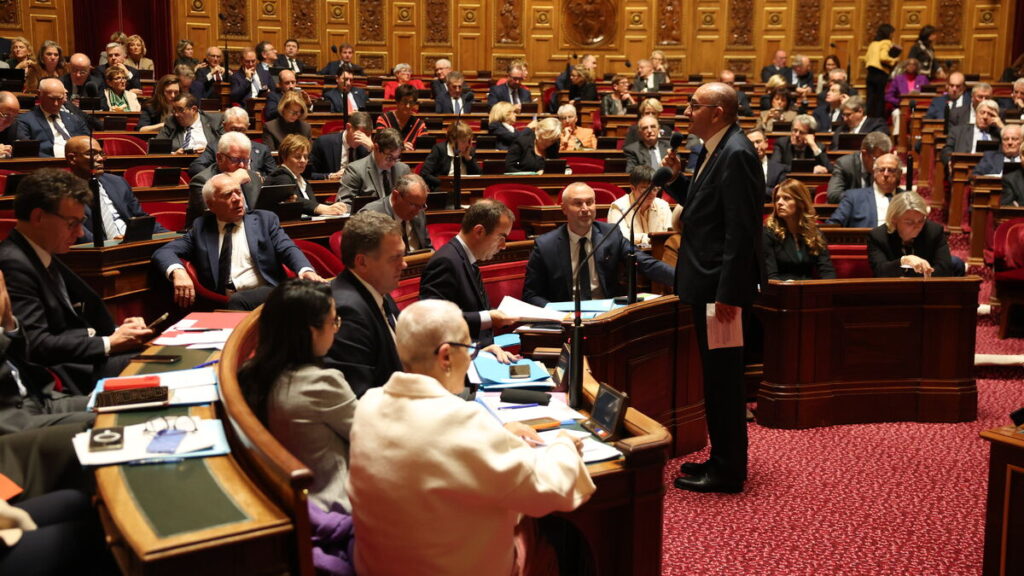
This is a largely revised text that will return to the Assembly after senators and deputies failed to find agreement this Wednesday evening in the Joint Committee.
The Senate amended the draft Social Security budget for 2026, which was adopted at the Luxembourg Palace this Wednesday afternoon. Here are the main points of the new text.
The Social Security Financing Bill (PLFSS), passed by the upper house, reduces the projected Social Security deficit to 17.6 billion euros in 2026, compared with 23 billion euros in 2025, according to government calculations.
The balance is very close to the government’s initial target set at 17.5 billion. The copy of the work of the National Assembly on first reading clearly worsens the deficit, to more than 24 billion euros in 2026.
This is unacceptable for the government, which has set a deficit of below 20 billion euros next year as an “absolute red line”.
A major concession from Prime Minister Sébastien Lecornu to the Socialists to avoid censorship, the suspension of pension reform until 2028 no longer appears in the text, having been scrapped in the Senate. But there is no doubt that the Assembly will restore it.
This suspension meant that the generation born in 1964 had to leave at the age of 62 years 9 months (like the previous generation), not the 63 years determined by the reform. These policyholders will get 170 quarters of the contribution instead of 171.
This suspension was also extended to long-term careers and people born in the first quarter of 1965, at the request of the left, excluding LFIs who only saw a time lag.
The total cost will be 300 million in 2026 and 1.9 billion in 2027.
- Social benefits, pension
At the heart of the Social Security budget is the question of the annual revaluation of pension funds and social benefits (family allowance, RSA, etc.), usually indexed to inflation.
The government proposed freezing these funds, an unpopular but useful measure to restore social accounts, as this would raise 3.6 billion euros by 2026.
It was unthinkable for the National Assembly, which abolished it. However, this was big enough for the Senate, which reconstituted it, but kept the allowance for adults with disabilities (AAH) and in particular the pension under 1,400 euros. A compromise that would yield 1.9 billion euros.
The expansion of the scope of the medical franchise to dental consultations and medical equipment (prostheses, glasses, dressings, etc.), proposed by the government, did not please the Assembly and the Senate. Likewise with the article which aims to limit excess doctor fees.
The government is also considering doubling the reduction in medical expenses for patients, but this very annoying provision will have to be passed by decree.
An additional tax on mutual insurance companies, which many feared would impact policyholders, was abolished by the Assembly but it was reintroduced in the Senate, with a revenue of one billion euros.
- CSG, maternity leave and “Ondam”
Proposed by left-wing groups but also scrapped in the Senate, an increase in CSG – one source of social protection financing – imposed specifically on venture capital income is also back under debate. The measure initially approved in the Assembly was expected to raise 2.8 billion euros by 2026.
Rightfully so, the measure providing reduced overtime contributions to companies with more than 250 employees is supported by both houses of Parliament at this stage.
The government also plans to introduce a new “paternity leave”, allowing parents each to take up to two extra months to welcome their child.
The creation of a “French Health network” to improve access to healthcare in the region, one of Sébastien Lecornu’s first announcements, also appeared in the Assembly text, but the Senate removed it, denouncing it as an empty shell.
Considered “insincere” and “unsustainable” by many lawmakers from both houses, the health insurance spending target for 2026 (Ondam), an increase of 1.6% compared to 2025, continues to be the subject of debate.
The one billion euro increase, including 850 million for hospitals and clinics, promised by the government, was not enough to convince the Senate, which abolished Ondam to show its dissatisfaction.





